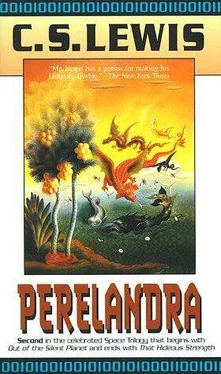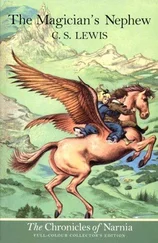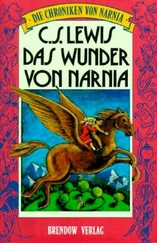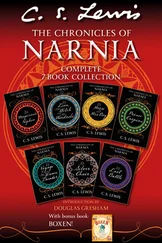Clive Lewis - Perelandra
Здесь есть возможность читать онлайн «Clive Lewis - Perelandra» — ознакомительный отрывок электронной книги совершенно бесплатно, а после прочтения отрывка купить полную версию. В некоторых случаях можно слушать аудио, скачать через торрент в формате fb2 и присутствует краткое содержание. Жанр: Религиоведение, Фэнтези, на английском языке. Описание произведения, (предисловие) а так же отзывы посетителей доступны на портале библиотеки ЛибКат.
- Название:Perelandra
- Автор:
- Жанр:
- Год:неизвестен
- ISBN:нет данных
- Рейтинг книги:4 / 5. Голосов: 1
-
Избранное:Добавить в избранное
- Отзывы:
-
Ваша оценка:
- 80
- 1
- 2
- 3
- 4
- 5
Perelandra: краткое содержание, описание и аннотация
Предлагаем к чтению аннотацию, описание, краткое содержание или предисловие (зависит от того, что написал сам автор книги «Perelandra»). Если вы не нашли необходимую информацию о книге — напишите в комментариях, мы постараемся отыскать её.
Perelandra — читать онлайн ознакомительный отрывок
Ниже представлен текст книги, разбитый по страницам. Система сохранения места последней прочитанной страницы, позволяет с удобством читать онлайн бесплатно книгу «Perelandra», без необходимости каждый раз заново искать на чём Вы остановились. Поставьте закладку, и сможете в любой момент перейти на страницу, на которой закончили чтение.
Интервал:
Закладка:
Both the bodies were naked, and both were free from any sexual characteristics, either primary or secondary. That, one would have expected. But whence came this curious difference between them? He found that he could point to no single feature wherein the difference resided, yet it was impossible to ignore. One could try-Ransom has tried a hundred times to put it into words. He has said that Malacandra was like rhythm and Perelandra like melody. He has said that Malacandra affected him like a quantitative, Perelandra like an accentual, metre. He thinks that the first held in his hand something like a spear, but the hands of the other were open, with the palms towards him. But I don’t know that any of these attempts has helped me much. At all events what Ransom saw at that moment was the real meaning of gender. Everyone must sometimes have wondered why in nearly all tongues certain inanimate objects are masculine and others feminine. What is masculine about a mountain or feminine about certain trees? Ransom has cured me of believing that this is a purely morphological phenomenon, depending on the form of the word. Still less is gender an imaginative extension of sex. Our ancestors did not make mountains masculine because they projected male characteristics into them. The real process is the reverse. Gender is a reality, and a more fundamental reality than sex. Sex is, in fact, merely the adaptation to organic life of a fundamental polarity which divides all created beings. Female sex is simply one of the things that have feminine gender; there are many others, and Masculine and Feminine meet us on planes of reality where male and female would be simply meaningless. Masculine is not attenuated male, nor feminine attenuated female. On the contrary, the male and female of organic creatures are rather faint and blurred reflections of masculine and feminine. Their reproductive functions, their differences in strength and size, partly exhibit, but partly also confuse and misrepresent, the real polarity. All this Ransom saw, as it were, with his own eyes. The two white creatures were sexless. But he of Malacandra was masculine (not male); she of Perelandra was feminine (not female). Malacandra seemed to him to have the look of one standing armed, at the ramparts of his own remote archaic world, in ceaseless vigilance, his eyes ever roaming the earthward horizon whence his danger came long ago. “A sailor’s look,” Ransom once said to me; “you know . . . eyes that are impregnated with distance.” But the eyes of Perelandra opened, as it were, inward, as if they were the curtained gateway to a world of waves and murmurings and wandering airs, of life that rocked in winds and splashed on mossy stones and descended as the dew and arose sunward in thin-spun delicacy of mist. On Mars the very forests are of stone; in Venus the lands swim. For now he thought of them no more as Malacandra and Perelandra. He called them by their Tellurian names. With deep wonder he thought to himself, “My eyes have seen Mars and Venus. I have seen Ares and Aphrodite.” He asked them how they were known to the old poets of Tellus. When and from whom had the children of
Adam learned that Ares was a man of war and that Aphrodite rose from the sea foam? Earth had been besieged, an enemy occupied territory, since before history began. The gods have no commerce there. How then do we know of them? It comes, they told him, a long way round and through many stages. There is an environment of minds as well as of space. The universe is one-a spider’s web wherein each mind lives along every line, a vast whispering gallery where (save for the direct action of Maleldil) though no news travels unchanged yet no secret can be rigorously kept. In the mind of the fallen Archon under whom our planet groans, the memory of Deep Heaven and the gods with whom he once consorted is still alive. Nay, in the very matter of our world, the traces of the celestial commonwealth are not quite lost. Memory passes through the womb and hovers in the air. The Muse is a real thing. A faint breath, as Virgil says, reaches even the late generations. Our mythology is based on a solider reality than we dream: but it is also at an almost infinite distance from that base. And when they told him this, Ransom at last understood why mythology was what it was-gleams of celestial strength and beauty falling on a jungle of filth and imbecility. His cheeks burned on behalf of our race when he looked on the true Mars and Venus and remembered the follies that have been talked of them on Earth. Then a doubt struck him.
“But do I see you as you really are?” he asked.
“Only Maleldil sees any creature as it really is,” said Mars. “How do you see one another?” asked Ransom.
“There are no holding places in your mind for an answer to that.”
“Am I then seeing only an appearance? Is it not real at all?”
“You see only an appearance, small one. You have never seen more than an appearance of anything-not of Arbol, nor of a stone, nor of your own body. This appearance is as true as what you see of those.”
“But . . . there were those other appearances.”
“No. There was only the failure of appearance.”
“I don’t understand,” said Ransom. “Were all those other things-the wheels and the eyes-more real than this or less?”
“There is no meaning in your question,” said Mars. “You can see a stone, if it is a fit distance from you and if you and it are moving at speeds not too different. But if one throws the stone at your eye, what then is the appearance?”
“I should feel pain and perhaps see splintered light,” said Ransom. “But I don’t know that I should call that an appearance of the stone.”
“Yet it would be the true operation of the stone. And there is your question answered. We are now at the right distance from you.”
“And were you nearer in what I first saw?”
“I do not mean that kind of distance.”
“And then,” said Ransom, still pondering, “there is what I had thought was your wonted appearance-the very faint light, Oyarsa, as I used to see it in your own world. What of that?”
“That is enough appearance for us to speak to you by. No more was needed between us: no more is needed now. It is to honour the King that we would now appear more. That light is the overflow or echo into the world of your senses of vehicles made for appearance to one another and to the greater eldila.”
At this moment Ransom suddenly noticed an increasing disturbance of sound behind his back of unco-ordinated sound, husky and pattering noises which broke in on the mountain silence and the crystal voices of the gods with a delicious note of warm animality. He glanced round. Romping, prancing, fluttering, gliding, crawling, waddling, with every kind of movement-in every kind of shape and colour and size-a whole zoo of beasts and birds was pouring into a flowery valley through the passes between the peaks at his back. They came mostly in their pairs, male and female together, fawning upon one another, climbing over one another, diving under one another’s bellies, perching upon one another’s backs. Flaming plumage, gilded beaks, glossy flanks, liquid eyes, great red caverns of whinneying or of bleating mouths, and thickets of switching tails, surrounded him on every side. “A regular Noah’s Ark!” thought Ransom, and then, with sudden seriousness: “But there will be no ark needed in this world.
The song of four singing beasts rose in almost deafening triumph above the restless multitude. The great eldil of Perelandra kept back the creatures to the hither side of the pool, leaving the opposite side of the valley empty except for the coffin-like object. Ransom was not clear whether Venus spoke to the beasts or even whether they were conscious of her presence. Her connection with them was perhaps of some subtler kind-quite different from the relations he had observed between them and the Green Lady. Both the eldila were now on the same side of the pool with Ransom. He and they and all the beasts were facing in the same direction. The thing began to arrange itself. First, on the very brink of the pool, were the eldila, standing: between them, and a little back, was Ransom, still sitting among the lilies. Behind him the four singing beasts, sitting up on their haunches like fire-dogs, and proclaiming joy to all ears. Behind these again, the other animals. The sense of ceremony deepened. The expectation became intense. In our foolish human fashion he asked a question merely for the purpose of breaking it. “How can they climb to here and go down again and yet be off this island before nightfall?” Nobody answered him. He did not need an answer, for somehow he knew perfectly well that this island had never been forbidden them, and that one purpose in forbidding the other had been to lead them to this their destined throne. Instead of answering, the gods said, “Be still.”
Читать дальшеИнтервал:
Закладка:
Похожие книги на «Perelandra»
Представляем Вашему вниманию похожие книги на «Perelandra» списком для выбора. Мы отобрали схожую по названию и смыслу литературу в надежде предоставить читателям больше вариантов отыскать новые, интересные, ещё непрочитанные произведения.
Обсуждение, отзывы о книге «Perelandra» и просто собственные мнения читателей. Оставьте ваши комментарии, напишите, что Вы думаете о произведении, его смысле или главных героях. Укажите что конкретно понравилось, а что нет, и почему Вы так считаете.












